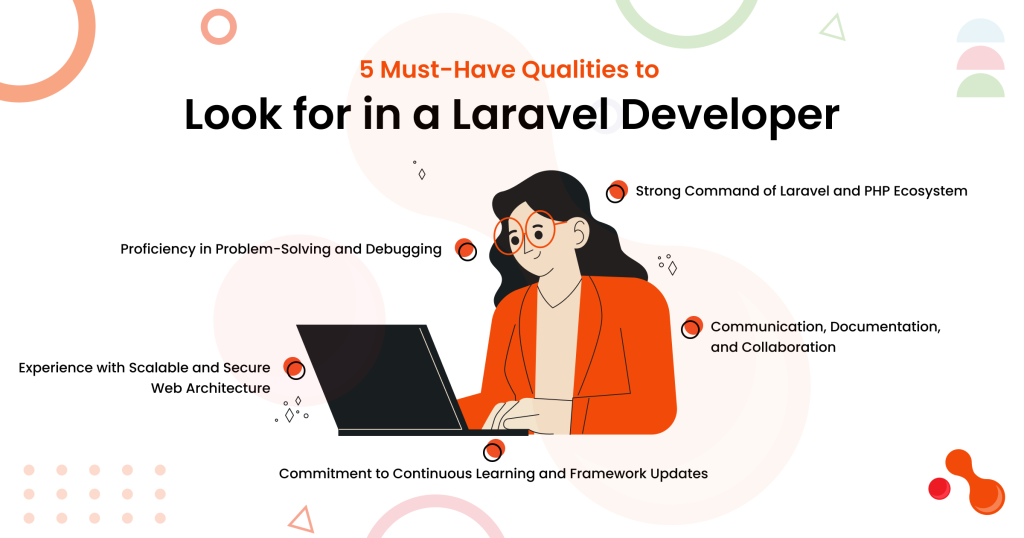Introduction
A startup founder once shared how their product missed three critical launch deadlines. The reason wasn’t a lack of funding or a weak idea. It was a poor hiring decision. They onboarded a Laravel developer with minimal Laravel experience, who treated it like plain PHP.
Laravel offers an elegant syntax, robust tooling, and an active ecosystem, but only when it’s in capable hands. If you didn’t consciously hire Laravel developers, it can bury your product in technical debt. The right one builds scalable features that last beyond the MVP phase!
That’s why a well-defined Laravel developer selection process is critical. You need someone with the right mix of technical capability, architectural thinking, and collaboration skills. In this blog, we’ll explore five must-have Laravel developer qualifications you need to evaluate before making a hire!
Let’s get started with the first quality!
Quality #1: Strong Command of Laravel and PHP Ecosystem
A qualified developer must bring advanced Laravel technical skills that go beyond writing routes and controllers. Laravel is a framework built on best practices, not shortcuts. That’s why deep knowledge of its internal architecture is the foundation for scalable applications.
From Laravel 10 onwards, new features like native types, improved route handling, and enhanced process handling demand developers who stay current. A strong candidate knows how to use Blade for templating, Artisan for automation, Laravel Mix for asset compilation, and Eloquent ORM for efficient database operations.
Real Laravel backend expertise also requires an understanding of core PHP principles. This includes familiarity with PSR coding standards and solid principles to ensure clean, reusable, and testable code.
If you want reliability in your application’s core structure, you must focus on Laravel-certified developers or professionals with a proven record of full-feature implementations. Strong backend logic and framework fluency cannot be optional.
Quality #2: Proficiency in Problem-Solving and Debugging
Real Laravel web development isn’t just about writing new features. It’s about identifying why something broke and fixing it fast. Strong Laravel problem-solving is essential for maintaining stability in production environments.
A skilled Laravel developer must know how to trace performance drops, resolve slow queries, and eliminate hidden logic errors. That requires a solid grasp of Laravel’s built-in debugging tools like Telescope and custom logging strategies. For deeper code-level analysis, they should be comfortable using Xdebug to inspect execution flow and variable states.
These capabilities form the foundation of reliable Laravel debugging skills. Whether it’s a broken relationship in Eloquent or an asset pipeline issue, a good developer handles it with precision and speed.
If you’re planning to optimize application response times, reduce server load, or diagnose high-traffic issues, this expertise also supports Laravel performance consulting goals.
Quality #3: Experience with Scalable and Secure Web Architecture
An expert in secure Laravel development must understand middleware, CSRF protection, input sanitization, and HTTPS implementation. They must prevent common threats like SQL injection and ensure all routes and data operations follow best security practices.
On the scalability front, experience with Laravel Octane, job queue systems, Redis, and route caching makes a major difference. These tools improve performance under traffic spikes and optimize memory usage without changing application logic.
Developers working on scalable Laravel applications also know how to build RESTful APIs, configure rate limiting, and handle concurrent user activity using WebSockets or broadcasting.
If you’re building for growth, these skills are non-negotiable. You need enterprise Laravel developers who can design an architecture that remains stable and secure even as traffic and data increase over time.
Quality #4: Communication, Documentation, and Collaboration
The best Laravel developers write clean code and explain it clearly. Strong communication skills of developers are essential for keeping both technical and non-technical team members aligned throughout the project.
A qualified Laravel developer can articulate why a specific architecture was chosen or how a new feature impacts the backend. This becomes critical when product managers, QA teams, and stakeholders depend on clear context to make decisions.
Beyond communication, reliable Laravel developer collaboration habits include well-documented code, consistent Git commits, and use of tools like Jira, Slack, or Asana for daily progress tracking. Developers who push undocumented features or skip tickets create unnecessary friction.
In a distributed setup, successful remote Laravel team integration depends on how well a developer documents their thought process, participates in asynchronous discussions, and maintains project visibility.
Quality #5: Commitment to Continuous Learning and Framework Updates
Developers who stay updated ensure their application benefits from the latest performance upgrades, security patches, and best practices. As Laravel evolves rapidly, that’s why Laravel community involvement is more than a bonus!
A strong developer keeps up with Laravel release notes, watches Laracasts regularly, and engages in forums like Laracasts Discuss or Laravel.io. Many also contribute to open-source packages or GitHub issues, demonstrating a real commitment to the ecosystem.
When hiring updated Laravel developers, look for signs that they follow PHP trends, understand feature deprecations, and explore Laravel-specific tooling like Pint, Octane, and Livewire.
You gain more than just code when you consult Laravel technology experts who stay ahead. You get future-ready architecture, packages that don’t break with version upgrades, and practices aligned with what the community considers optimal today.
How to Assess These Qualities During the Hiring Process?
Identifying the right Laravel developer requires a structured approach.
- Start by preparing a set of targeted Laravel interview questions that test framework knowledge, debugging skills, and architectural understanding.
- Include scenario-based prompts like “How would you handle a slow-performing Eloquent query?” to uncover depth of experience.
- Next, include a code test or a pair programming session.
This allows you to observe how the developer solves real problems, manages time, and thinks through architecture. Trial projects with fixed timelines also help in evaluating Laravel developers on both output and reliability.
- Conduct a behavioral interview to understand their communication habits, willingness to learn, and comfort with tools like Git, Jira, and Slack.
If you need faster, pre-screened options, consider working with platforms that offer Laravel developer vetting services. These services provide access to developers already evaluated for the exact skills and mindset your project requires.
Bottomline
A skilled Laravel developer contributes more than just clean syntax. They bring structured thinking, efficient debugging, and consistent delivery that aligns with business goals. The right hire supports your product’s stability, scalability, and long-term performance.
Each of the five qualities discussed helps reduce delivery risk, improve sprint outcomes, and build a foundation your backend can rely on. These are not optional traits. They are essential benchmarks for technical hiring.






